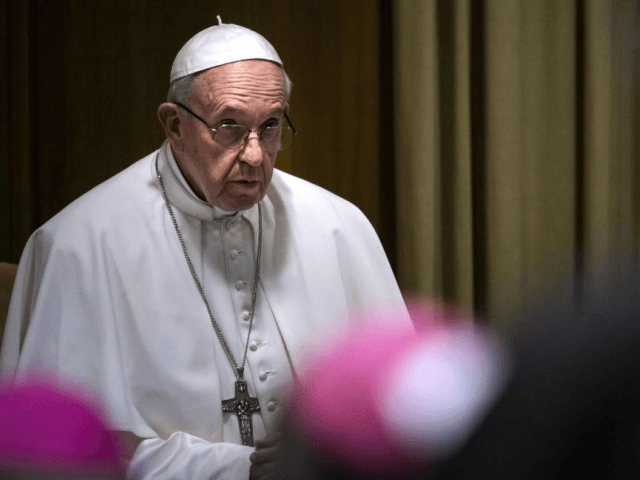Pope Francis urged Catholics to support the United Nation’s Sustainable Development Goals (SDGs) Friday, asserting they are “supported by our deepest religious and ethical values.”
Speaking in the Vatican to participants at an international conference on “Religions and the Sustainable Development Goals: Listening to the Cry of the Earth and of the Poor,” the pontiff said the SDGs, which mandate climate action and gender equality among other things, represent “a great step forward for global dialogue.”
Approved by more than 190 nations, the goals marked a vitally “new and universal solidarity,” Francis said. The goals also happen to clash with certain tenets of Catholic morality, something the pope declined to mention.
“Different religious traditions, including the Catholic tradition, have embraced the objectives of sustainable development because they are the result of global participatory processes that, on the one hand, reflect the values of people and, on the other, are sustained by an integral vision of development,” he said.
“We should all commit ourselves to promoting and implementing the development goals that are supported by our deepest religious and ethical values,” he added.
It was unclear from the pope’s words whether he believes that all results of a “global participatory process” are necessarily positive or whether the “values of people” always reflect true human goods in harmony with the Christian view of the human person.
The modern economic system has embraced a mentality “where progress is assessed only in terms of material growth,” the pope continued, “on account of which we are almost obliged to irrationally exploit the environment and our fellow human beings.”
Regarding what he hopes will come from the conference, Francis pointed to “solutions.”
“Solutions are what I hope will emerge from this Conference: concrete responses to the cry of the earth and the cry of the poor. Concrete commitments to promoting real development in a sustainable way through processes open to people’s participation,” he said.
The pope also waded into murky theological and sociological territory when he asserted that the “key principle of all religions is the love of neighbor and the care of creation.”
That have been religions in history — and there are some today — that would unhesitatingly reject the claim that their “key principle” is love of neighbor and care of creation. This definitely does not seem to be the case of Hinduism or Scientology, and any serious Muslim would reject this assertion on its face.
Even for Christians, however, this bold declaration is not intuitively clear. While Jesus undeniably preached love of neighbor, he also said that the first and greatest commandment is to love God above all things, something curiously absent in the pope’s pronouncement.
Moreover, it has always seemed central to Christianity (and to other religions as well) that its message of salvation is unique, rather than shared with all the other religions of the world. It would be peculiar if all the different religions around the globe happened to share the same two “key principles.”
In his address Friday, the pope also held up the special importance of indigenous peoples, who “help protect approximately eighty per cent of the planet’s biodiversity.”
Francis said that “in a strongly secularized world, such peoples remind us all of the sacredness of our earth. This means that their voice and their concerns should be at the center of the implementation of the 2030 Agenda and at the heart of the search for new paths for a sustainable future.”
Follow Thomas D. Williams on Twitter Follow @tdwilliamsrome

COMMENTS
Please let us know if you're having issues with commenting.